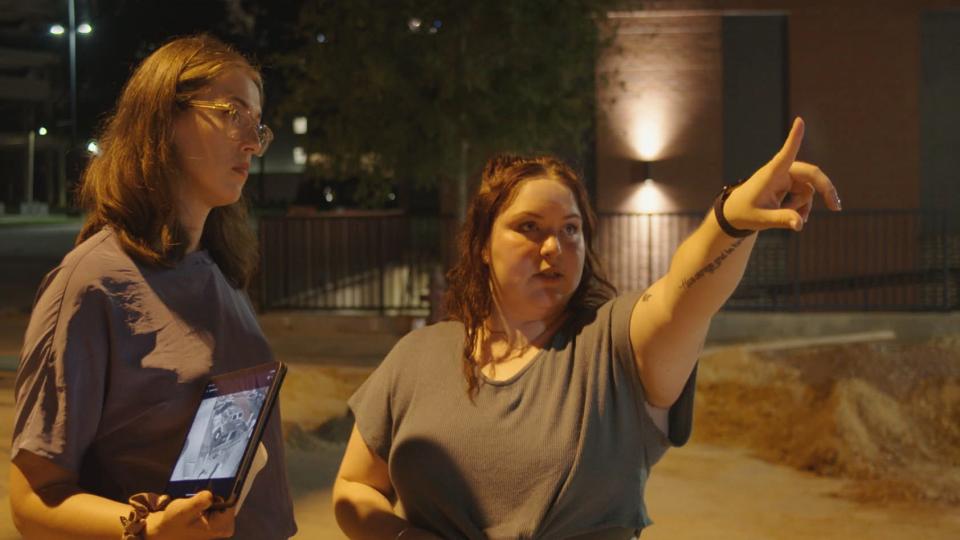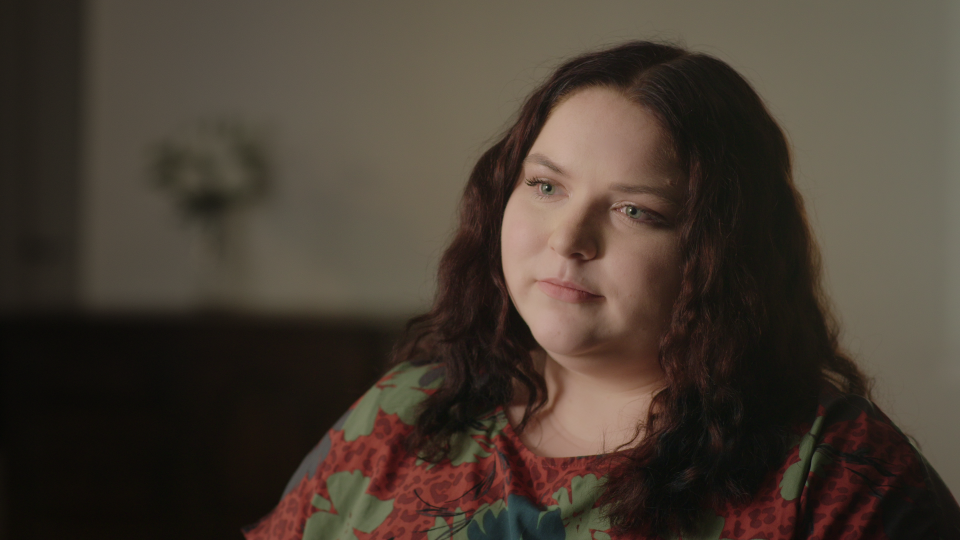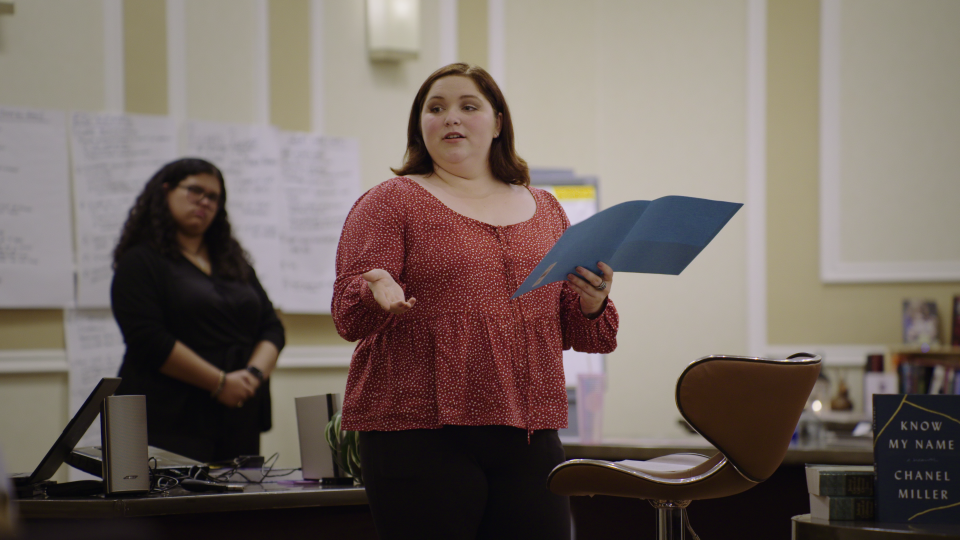Police said she lied about being raped. Now Emma Mannion is fighting to clear her name
The terror comes at night.
Emma Mannion is 25 years old now, owns a dance studio where she works with children and is the subject of an angering/inspiring Netflix documentary film.
But in her nightmares, she is 18 again.
She's sitting alone in a Tuscaloosa hospital room, wearing only a thin gown after the worst night of her life. And the police are there.
She's telling them she's been raped. The police aren't helping. They're making it worse. They're betraying her.
"It's a broken trust thing," Mannion said, trying, somehow, to explain the source of the terror. "When I'm asleep sometimes I feel like that 18-year-old girl who is terrified and depressed and struggling, and then I wake up and I go to work and I have the blessing of working with crazy children who make my day so much better."
The recurring nightmares, unfortunately for Mannion, match what happened in real life.
Not only did police not help, they arrested her.
In November of 2016, Tuscaloosa Police accused Mannion of making up a false rape story. During questioning, police lied to her (which their rules allow them to do), saying they had videotape that contradicted her story.
The police did not have contradictory video. After police flipped the focus of their investigation from finding a rapist to honing in on Mannion herself, Mannion eventually pleaded guilty to making a false report as a "youthful offender." (She was 18 at the time.) Her case was sealed, and she served a few hours of jail time.
Her attorney, Leroy Maxwell, wanted to take the case to trial, she said, but Mannion decided to take the lesser guilty plea "because of my mental health. I had a hard enough time waking up every day, let alone convincing a courtroom that the police didn’t do their job."
Emails requesting interviews were sent to the Tuscaloosa Police Department, the Tuscaloosa County Sheriff's Office, the Tuscaloosa County Probate Judge's Office and the City of Tuscaloosa. So far, none of those organizations have responded.
More: Brad Harper: Crime coverage must benefit the community

Newspapers, including The Tuscaloosa News, ran Mannion's mug shot with headlines like this one: "Police: University of Alabama student lied about sexual assault." In those early days, no news outlet reached Mannion for an explanation.
Tuscaloosa homicide captain Gary Hood said on television at the time, "When a false report is made like this, then the person that makes the report such as that, well, they need to suffer the consequences."
"Those original articles cost me friends. They cost me jobs," Mannion said. "I don't know why, if you're writing an article about a young girl, you wouldn't try to talk to her."
The Netflix documentary "Victim/Suspect" examines the phenomenon of rape accusers being arrested, with Mannion's story as one of the main narrative threads. The documentary follows investigative reporter Rachel de Leon as she discovers a pattern of women who make accusations, are lied to by police and end up charged with crimes.
On Nov. 9, Mannion and de Leon are scheduled to be in Tuscaloosa for a screening of the film. The details of the event are not yet firm, de Leon said.
In a recent interview, Mannion said she did not lie about the rape. She said she was manipulated into doubt by police tactics that should never be used on rape accusers.
Too many people, she said, recognize her as the girl who lied. "As far as the public knows, that (filing a false report) was the charge that was written against me," Mannion said. "The public is wrong, and I will right that wrong."
Today, Mannion is trying to get her guilty plea thrown out (the case is on appeal), and her reputation restored. She said her civil rights were violated when police failed to produce all the video they had gathered on the night Mannion said the attack took place.

"The film has really kind of catapulted my healing over the last few years," she said. "And I think that it's allowed me to feel more confident and comfortable with discussing what happened from a factual standpoint."
The film is powerful, and has led to Mannion working with police organizations to improve their procedures when people allege rape.
de Leon, who works at the Center for Investigative Reporting based in Emeryville, CA, said she has found more than 220 cases in which an accuser has been charged with making a false report.
"It's rare (for a case) to become a false reporting charge," de Leon said. "It's important we look into each one of them. It's subtle and scary."
*****
'I do not believe you at all,'
It was an early Sunday morning after a football Saturday night in Tuscaloosa.
Mannion said she was walking with two men near Bryant-Denny Stadium after midnight on Nov. 13, 2016. She said she was forced into a car with one of the men and he raped her.
She said her attacker's name was Steven.
In the week after Mannion's report, police found videotape from businesses in the area. Then they called in Mannion for more questioning.
The police concluded Mannion was lying.
From an email sent by de Leon to The USA Today Network: "In Emma's interview with police, Jared Akridge mentions how much time they've spent pulling videos and that those videos contradict what she told them. He specifically mentions a video showing her and the alleged perp 'making out' and that he knows she got into the vehicle with him.
In Emma's case report, it's noted that an officer from the University of Alabama Police Department located footage of Emma walking arm in arm with the suspect and 'making out.'
It appears, based on the surveillance footage sent to me from the Sheriff's office, that Akridge lied when he told her there was video showing she was not being honest with him ..."
de Leon provided a partial transcript of Akridge's interview with Mannion:
Akridge: We’ve been investigating this all week, we have pulled, oh, if you have any idea how many video cameras are around there, all of that has been pulled, okay? And this is what I think. I think there’s some stuff going on and you got a little farther in the story than you intend to do, because I’m going to tell you from the investigation, you’re not being honest with me, okay?
Mannion: With what I just told you?
Akridge: Yes. And by what video’s showing and what the witnesses are saying.
Later Akridge says, "I do not believe you at all, and I think you're one of those people that's taking away from my true victims."
Akridge tells her to think about all the police working overtime, searching for videotape, interviewing people, to investigate her story.
She says, "I'm so sorry."
He says, "It is a crime to file that false report. It is a crime to lie to us. And I have to arrest you for it."
Mannion nods.
And he puts handcuffs on her and tells her she is under arrest.
In the footage shown in the documentary, she did not confess to making up a story.
In the video later provided by the police, the woman shown kissing a man in a parking lot is not Mannion. And the parking lot is not where she said the assault occurred.
Mannion's first attempt to have her record expunged was denied by a lower court in Alabama. She now waits for a ruling on her appeal in Montgomery Circuit Court.
If the court rules in her favor and erases her criminal record, Mannion is considering civil action. She said she has discussed civil action with her attorney, and she is prepared.
*****
The online comments were the worst.
And the worst of the comments was from a woman.
"This one young woman messaged me on Facebook saying that she hoped that I would actually be raped," Mannion said. "She was willing enough and confident enough in this right to tell a stranger that she wished rape upon them."
She has paid a high price for that guilty plea. She uses her middle name on social media to make it more difficult for people to attack her.
Mannion said people either immediately don't trust her when they find out who she is, or they are so full of pity it makes her uncomfortable. People tell her the most horrible stories of their own trauma.
"I'm not a therapist. I'm not a social worker," she said. "... This is still something I'm struggling to wrap my head around."
She continued, "I would say that 75 percent of me is really humbled and honored that this group of people (those with trauma) has chosen to trust in me and allowed me to speak my truth. And there's a very big 25 percent of me that feels that weight a lot. It's uncomfortable, and it feels very heavy."
*****
The police, she said, need to change.
The documentary exposes an interviewing tactic (called the "Reid Technique") in which they coax confessions by making the subject of their questions feel uncomfortable. The detectives get close and even touch the suspects as they amp up the pressure. They lie and try to get the suspects to agree with their lies, suggesting that a confession would make them feel a lot better. It's a verbal trap. Mannion said those techniques shouldn't be used on rape accusers.
Mannion has participated in police training in San Diego, and an online training course.

"There are a lot of officers who are seeing this film who are made uncomfortable by this film, and I hope they are going to hold their peers accountable," she said. "That's the tricky part. You can go through all the training you want, but if you go back to the office and you're not holding yourself or the person next to you accountable, it's not going to make a difference."
de Leon said she knows the film has struck a nerve.
"We have made an impact," she said. "Prosecutors want to use the film for training."
*****
The suspicion around Emma Mannion has stopped DCH Regional Medical Center from working with her to find the rape kit that was taken after the incident, she said.
Mannion said a rapist is walking around free because of the way police and hospital officials dealt with her.
She said if she gets her guilty plea thrown out, she is considering civil action. She has an attorney who is ready, she said.
"I don't want to jinx anything, but that's part of the plan," she said.
Maybe the saddest part of Mannion's story is that her trust was broken.
"I, truthfully at this point, wish I would have kept my mouth shut," she said. "It just felt like we were going around in circles and at no point was I told I was no longer a victim. At no point was I told this was an interrogation.
"I was a naive 18-year-old who put trust in the wrong people."
Keith Sharon is a reporter and storyteller at The Tennessean. He can be reached at ksharon@tennessean.com.
This article originally appeared on The Tuscaloosa News: Tuscaloosa police labeled Emma Mannion a liar; film tells her story

